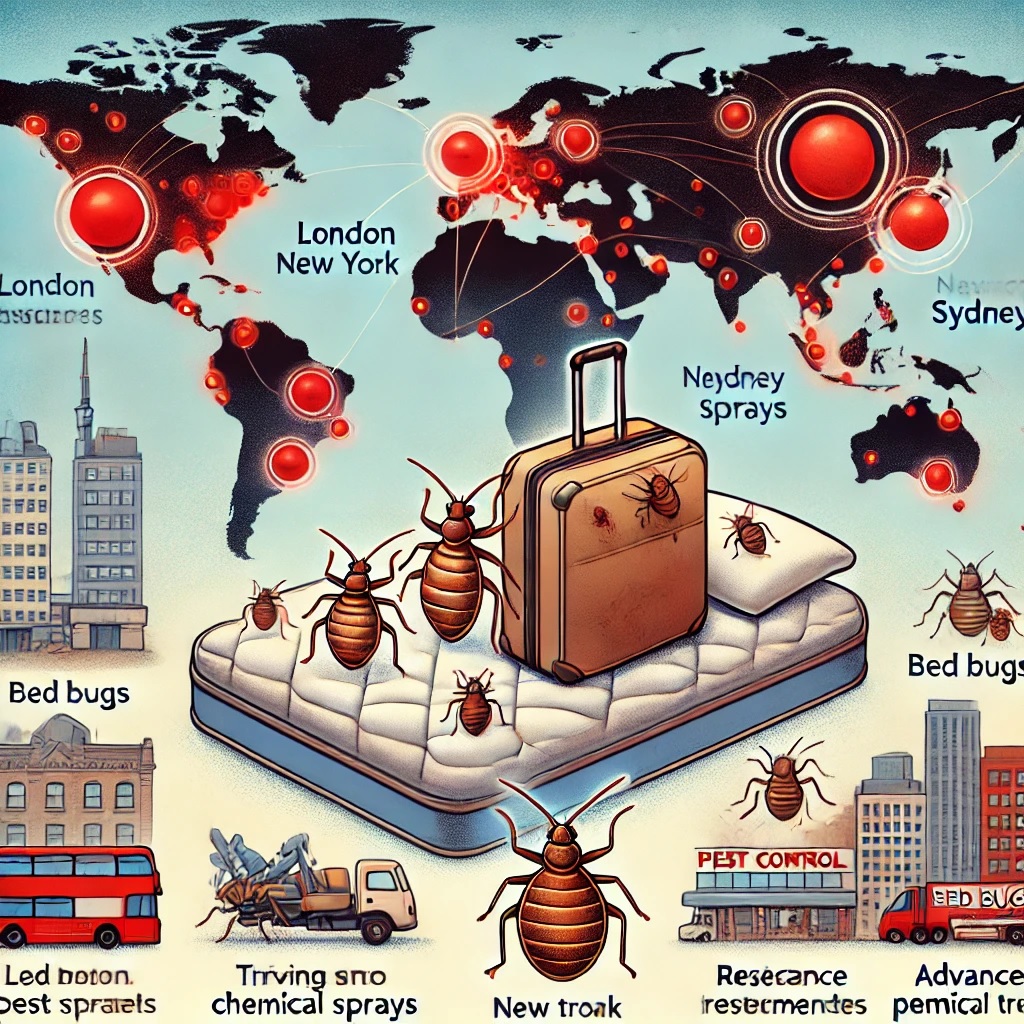Remember the days when bed bugs were practically unheard of? It’s safe to say that those days are long gone. Bed bugs have made a serious comeback in recent years, and infestations are on the rise worldwide. Whether you’re living in a busy city or travelling for work, chances are you’ve heard of – or even experienced – these pesky pests. But why are bed bugs making such a strong resurgence, and more importantly, what can you do to stop them?
Let’s dig into the latest bed bug population trends and explore how we can protect our homes from these blood-sucking invaders.

It wasn’t too long ago that bed bugs were almost wiped out, thanks to powerful pesticides used after WWII. But over the last couple of decades, we’ve seen a troubling comeback. Bed bugs have not only returned, but they’ve spread rapidly across major cities worldwide.
What’s causing this resurgence? A combination of factors is to blame. Global travel has exploded, making it easier than ever for bed bugs to hop from one country to another in suitcases and clothing. Urbanisation has also played a role – as more people live in closer quarters, bed bugs can easily spread through flats, hotels, and public transport.
But there’s another problem: these critters are getting smarter. Bed bugs have developed resistance to many of the insecticides that used to be so effective against them. It’s become a serious challenge for pest control professionals and property owners alike.
If you live in a city, you’re in the heart of bed bug territory. Bed bugs thrive in dense, urban environments where people live, work, and travel closely together. Cities like London, New York, and Sydney have seen massive spikes in infestations over the past few years, with apartment buildings and hotels being particularly vulnerable.
Why do bed bugs love cities so much? It’s not just about population density. In urban areas, people are constantly on the move – renting flats, staying in hotels, and using shared spaces like laundrettes. All these touchpoints make it easy for bed bugs to spread without anyone noticing.
Recent data shows that multi-unit housing, like flats and hostels, are hotbeds for bed bug activity. If one unit becomes infested, the bugs can quickly crawl through walls and floors to spread throughout the building. So, if you live in a shared building, it’s crucial to be on the lookout for signs of bed bugs early on.
One of the most frustrating reasons for the bed bug resurgence is their growing resistance to insecticides. Many of the products that used to work wonders – such as pyrethroids – are now less effective because bed bugs have adapted. This resistance means that bed bug populations are not only surviving treatments but thriving, leading to more widespread infestations.
That’s why more and more pest control professionals are turning to alternative treatments, such as heat treatments and combination methods. At ThermoPest, we’ve found that these approaches are much more effective against resistant bed bug populations, ensuring a more thorough extermination.
Bed bugs don’t care if you’re on holiday or travelling for business – they’ll gladly hitch a ride in your suitcase or clothing and follow you home. With more people travelling than ever before, it’s no surprise that bed bugs have become an international issue.
Hotels, hostels, and short-term rentals like Airbnb have seen a sharp rise in bed bug complaints. Once bed bugs make their way into a hotel room, they can quickly infest the entire property, jumping from one room to another via luggage, bedding, and even staff uniforms.
So, what can you do to protect yourself while travelling? Always inspect hotel rooms before unpacking, looking closely at the mattress seams and furniture for signs of bed bugs. Keep your luggage off the floor and use a luggage rack if possible. When you return home, wash and dry all your clothes on high heat, as this can kill any lingering bugs.
You might be wondering – do bed bugs have a “season”? The short answer is yes. While bed bugs are a year-round problem, their activity tends to spike in the summer months. Why? Warmer weather encourages more travel and movement, giving bed bugs plenty of opportunities to spread. They’re also more active in higher temperatures, which speeds up their reproduction cycle.
Summer is a busy season for bed bugs, but it’s also a time when people move house more frequently. When moving from one home to another, there’s a greater risk of bed bugs hitching a ride on furniture, clothing, or bedding.
To stay ahead of this seasonal trend, it’s a good idea to take extra precautions during the warmer months. Inspect your home regularly, especially after travelling or moving, and be quick to act if you notice any signs of bed bugs.
So, what’s the future looking like? Unfortunately, bed bugs aren’t going away anytime soon. Experts predict that infestations will continue to rise, especially in urban areas and regions with high travel activity. As these pests become more resistant to treatments, the demand for innovative solutions will only grow.
That said, there’s hope. Continued research into bed bug behaviour and resistance is helping pest control experts develop more effective treatments. At ThermoPest, we’re staying ahead of the curve by using the latest technology and methods to combat even the most stubborn infestations.

The resurgence of bed bugs is real, and it’s affecting more people every year. From cities to rural areas, bed bugs are becoming a widespread issue due to global travel, urbanisation, and resistance to traditional insecticides. But by staying informed, being proactive, and using the right treatments, you can keep these pests at bay.
At ThermoPest, we specialise in bed bug control and offer tailored solutions to tackle infestations head-on. Whether you’re dealing with bed bugs at home, in a hotel, or in a multi-unit property, we’re here to help. Contact us today for expert advice and effective treatment options.